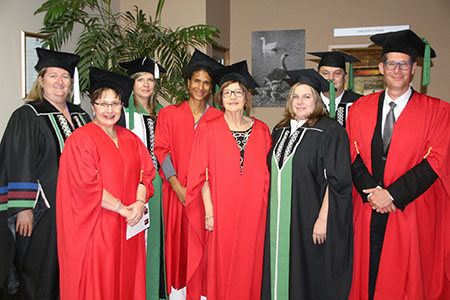The addition of Prof Isabella Aboderin and Prof Nora Keating further expands the expertise and impact of the NWU on ageing research. Prof Aboderin is a social gerontologist and senior research scientist, and head of the Aging and Development Unit at the African Population and Health Research Center (APHRC) in Nairobi, Kenya. Prof Keating is a social gerontologist and professor of Rural Ageing, Swansea University and co-director of research on aging, policies and practice at the University of Alberta, Canada.
The global perspective
Prof Keating focuses on the global perspective of environments and a good old age. The UN Global Agenda for 2030 adopted the principle that no one must be left behind. This agenda contains 17 sustainable development goals of which Prof Keating highlighted four important for a good old age:
- Goal 3: Ensure healthy lives and promote well-being for all at all ages
- Goal 10: Reduce inequality within and among countries
- Goal 11: Make cities and human settlements inclusive, safe, resilient and sustainable
- Goal 16: Promote inclusive and just societies, and effective and accountable institutions.
According to the World Health Organisation ‘improving the fit between older people and their environments is universally achievable’. Prof Keating argues that variables such as place, people and policy must be properly managed on national level to facilitate the achievement of these goals. Globally countries address the wellbeing of older people in creative ways. Good examples are Lebanon’s university for seniors and Russia’s foster family concept that was instituted in remote communities, whereby specific community members take care of older people by checking in with them and helping where needed.
Africa’s unique ageing context
Prof Aboderin discussed the development of ageing research in Africa since 1980, with a growing awareness and acceptance that aging is an issue on the African continent. She emphasised the need for a transformation towards a true ‘African gerontology’ that engages actively as an equal with advanced international scientific and theoretical debates on the subject.
According to Prof Aboderin four arcs of transformation is needed in African gerontology. The first is home-grown theorising instead of uncritical use of existing constructs and theories originating in Western contexts. In contrast with the Global North, Africa has a youth bulge. In Sub-Saharan Africa 78% of the population is under the age of 35, and will reach old age in the next 30-40 years. This demands an informed response from African governments to properly manage a potentially disastrous situation for present employment needs and future old age care.
The second arc of transformation is to clarify the case for action with regard to older persons. This requires a better understanding of how the old and young are linked on family, community and of society levels, and shifting conceptions about older people.
The third and fourth arcs necessitate engagement with policy and decision makers, and nurturing the next generation of researchers.
To further ageing research in the African context, the NWU plays an important role as an expertise hub, building on existing regional and international expertise to better serve the African continent.

From left: Prof Susan Coetzee-van Rooy (Acting Deputy Dean: Research, Innovation and Commercialisation), Prof Vera Roos (researcher: Optentia), Prof Linda du Plessis (Deputy Vice-Chancellor, Vanderbijlpark Campus), Prof Elrie Botha (Director: School of Industrial Psychology and Human Resources), Prof Isabella Aboderin, Prof Nora Keating, Prof Ian Rothmann (Director: Optentia research focus area) and Prof Jaco Hoffman (Optentia Sub-programme leader: Ageing and Generational Dynamics). 
